Dual CANbus monitor and instrumentation cluster. Presently tuned for the Nissan Leaf EV.
Dependencies: SPI_TFTx2_ILI9341 TFT_fonts TOUCH_TFTx2_ILI9341 mbed
Fork of CANary_corrupt by
After adding the LPC1768 platform, import as a program and do not select the "update to latest revision" box
User Guide
Eagle Schematic and Board design
/media/uploads/TickTock/canaryr6.zip
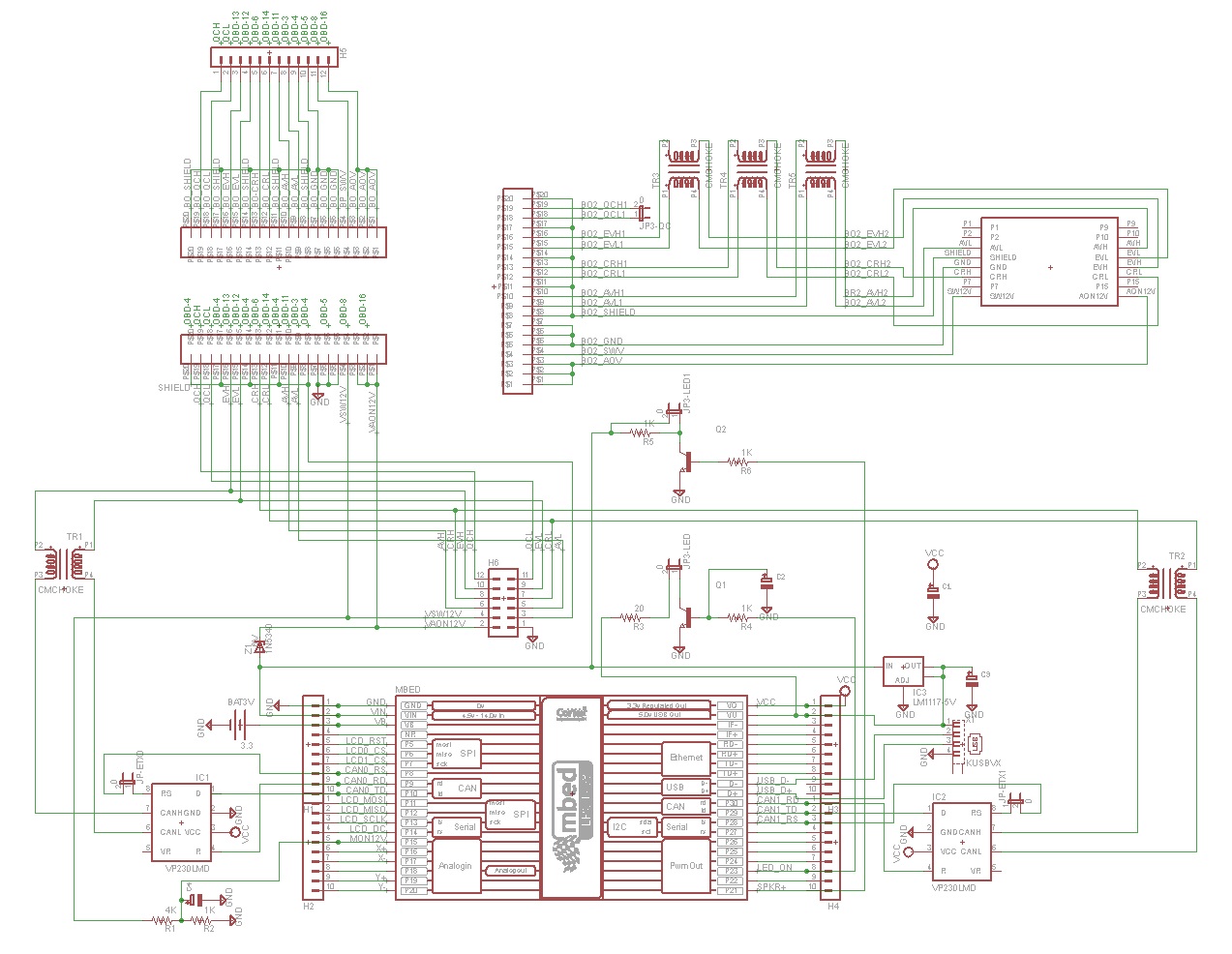
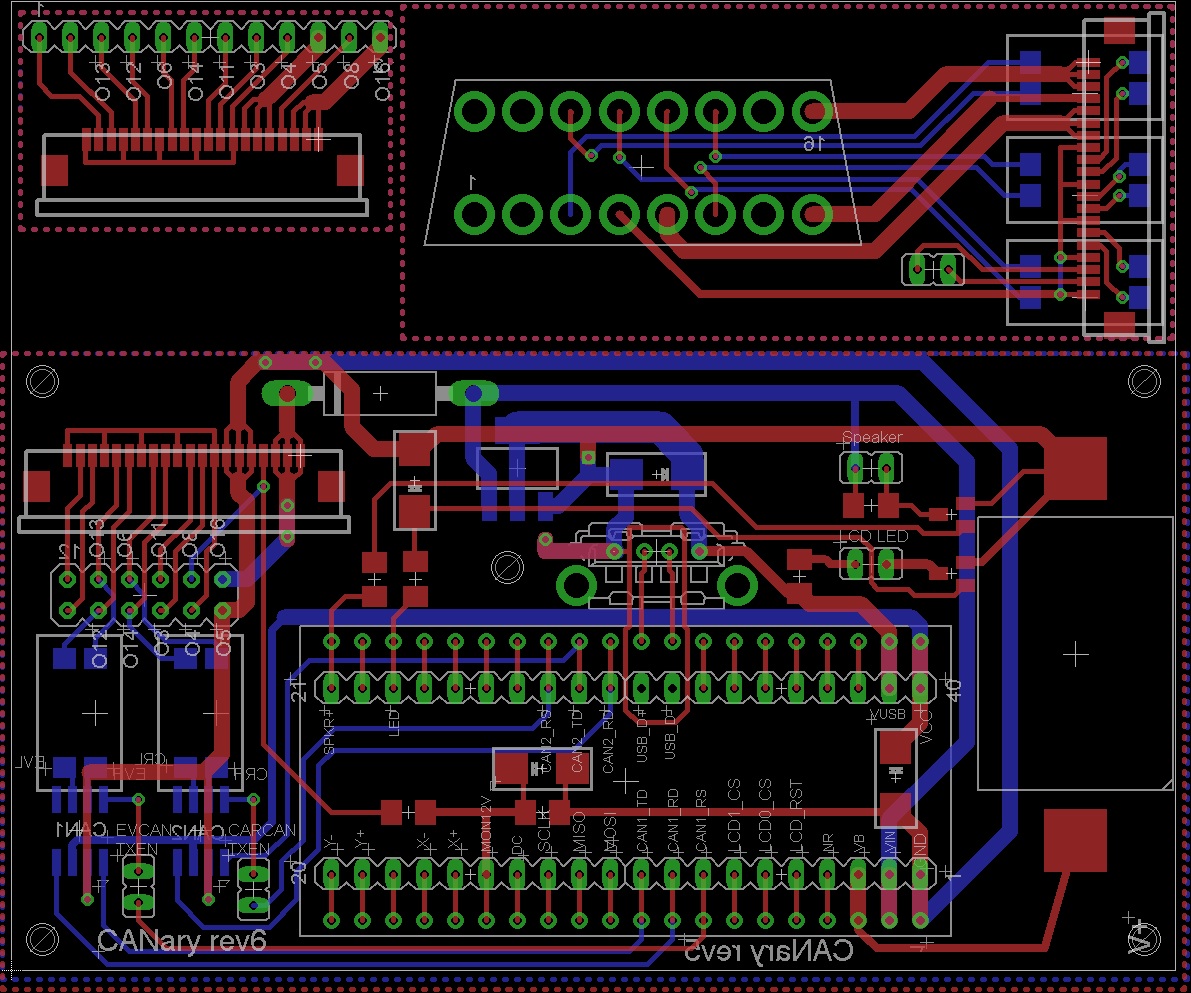
For LCD Rev 1.01:
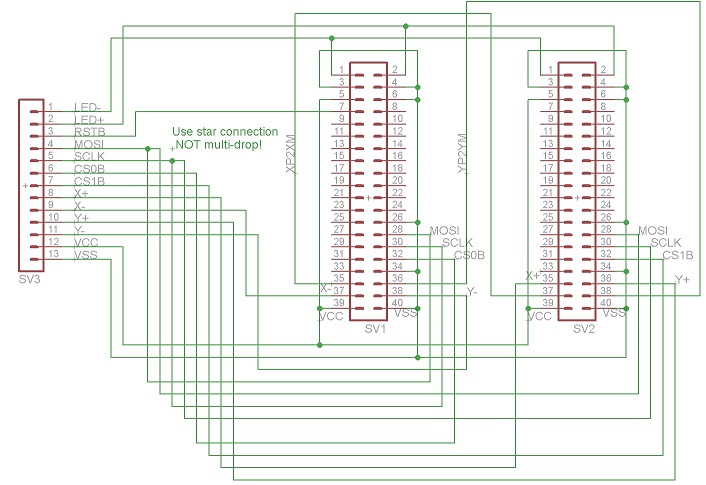
For VCD Rev 2.00:
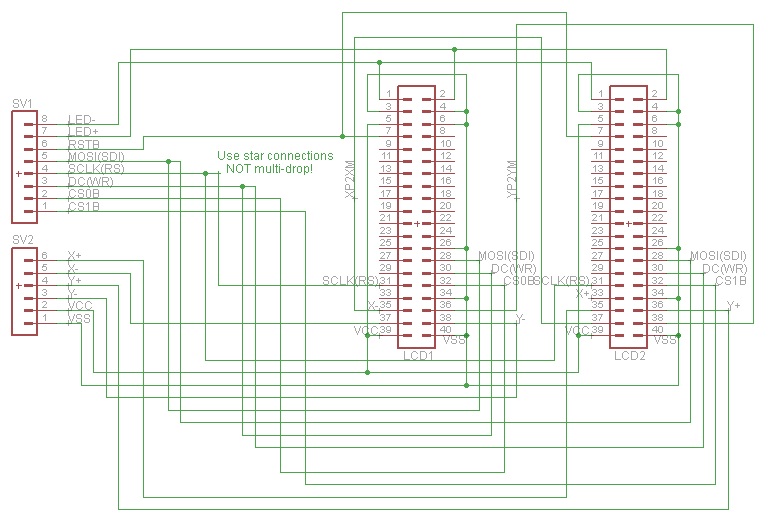
Parts List
Assembly
1) LCD Displays
I found ribbon cable is a nice way to organize the wires to the displays. There are two versions of the display and each must be wired differently. The original project used HW REV. 1.01. For that version, you'll need 12 conductors and I connected them in the following order:
| 1 | LED+ |
| 2 | LED- |
| 3 | RST |
| 4 | SDI |
| 5 | WR/SCLK |
| 6 | CS |
| 7 | X+ |
| 8 | X- |
| 9 | Y+ |
| 10 | Y- |
| 11 | VDD |
| 12 | GND |
If, instead, you have HW REV 2.0, you will need 13 conductors with the following order:
| 1 | LED+ |
| 2 | LED- |
| 3 | RST |
| 4 | SDI |
| 5 | RS (SCLK) |
| 6 | WR (DC) |
| 7 | CS |
| 8 | X+ |
| 9 | X- |
| 10 | Y+ |
| 11 | Y- |
| 12 | VDD |
| 13 | GND |
First I connected all the GND connections (2 GND & IM0, IM1, IM3 for REV1.01 or 2 GND, RD, & IM0 for REV2.00). Do not connect the bottom GND until you have the ribbon cable connected. After making all the ribbon cable connections (connecting the GND of the ribbon cable to the bottom GND pad), solder the GND bar from the previous step to the back of the bottom GND connection. Finally, make a connection from the back side 3.3V pin to IM2 for REV1.01 or to IM1,IM2,&IM3 for REV2.00. Take a break and repeat for the second display.
Examples of REV1.01 boards:
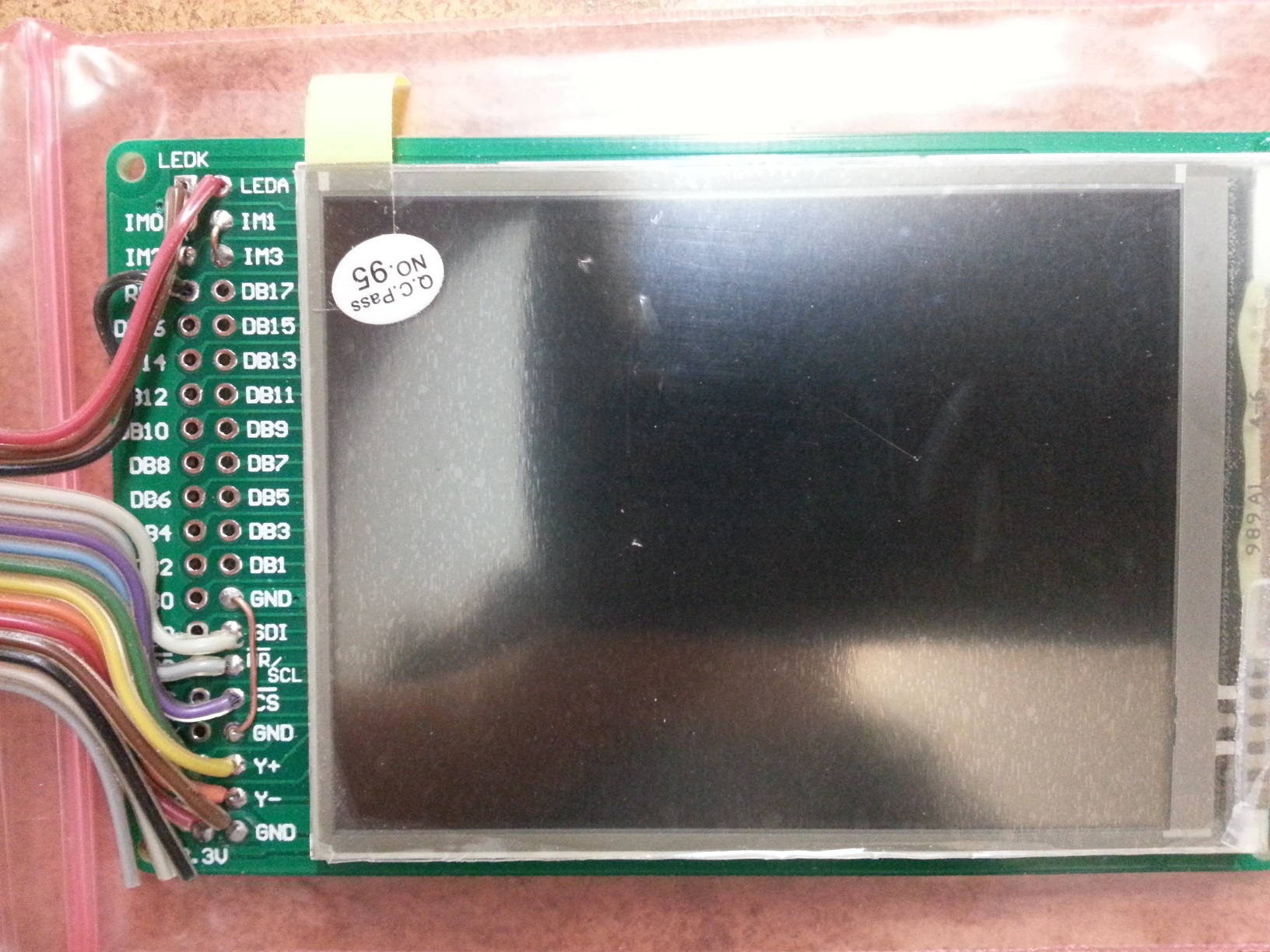
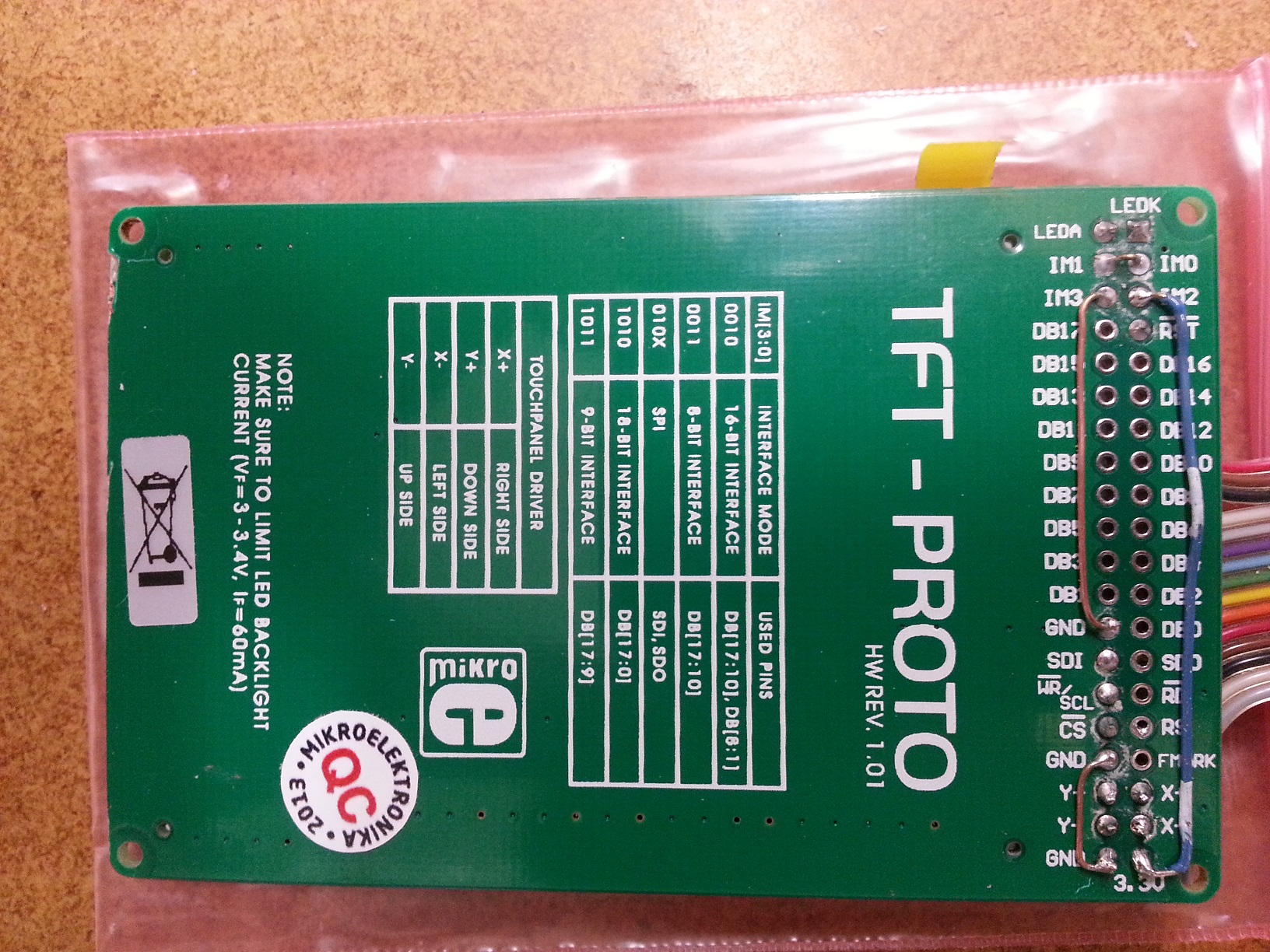
Examples of REV2.00:
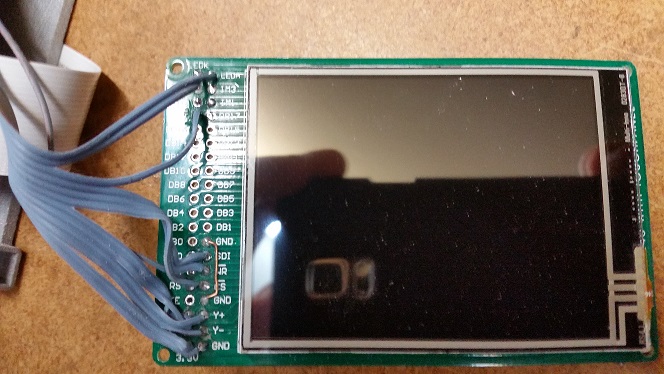
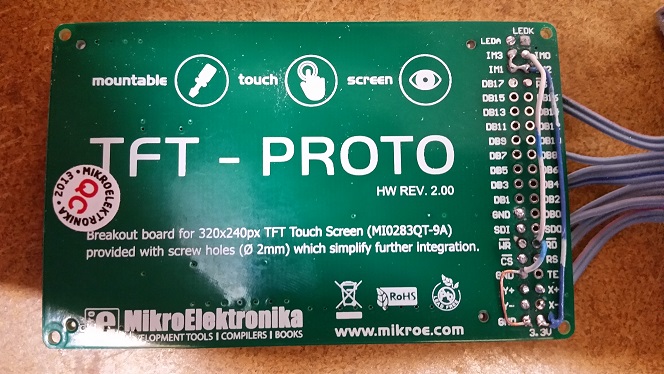
Once the two displays are complete combine all wires except CS0, CS1, X+, X-, Y+, and Y-. Connect X- of the left display to X+ of the right. Similarly connect Y- of the left display to Y+ of the right. Insulate any exposed wires.
2) PCB
Refer to the schematics to place all the components on the board. If you plan to install into the CANary 3D enclosure, DO NOT install the battery holder or the socket for the mbed and, instead, connect two wires to the VB and GND pads nearby. You will have to install the battery holder against the back wall to avoid interfering with the right-hand display and the mbed will have to be directly soldered. I have not found a socket with a low enough profile to fit in the space provided (depth of enclosure is limited by the space behind the center console). Also, I recommend keeping as much lead as possible on the Zener diode (bending it as shown to clear the back wall). Although it is operating well within parameters, the Zener gets quite hot during extended operation and the leads help dissipate the heat and keep it away from the PCB and other components.Update: Several Zeners have failed resulting in damage to some users boards so I recommend using a DC-DC converter instead to bring the 12V down to 7V.
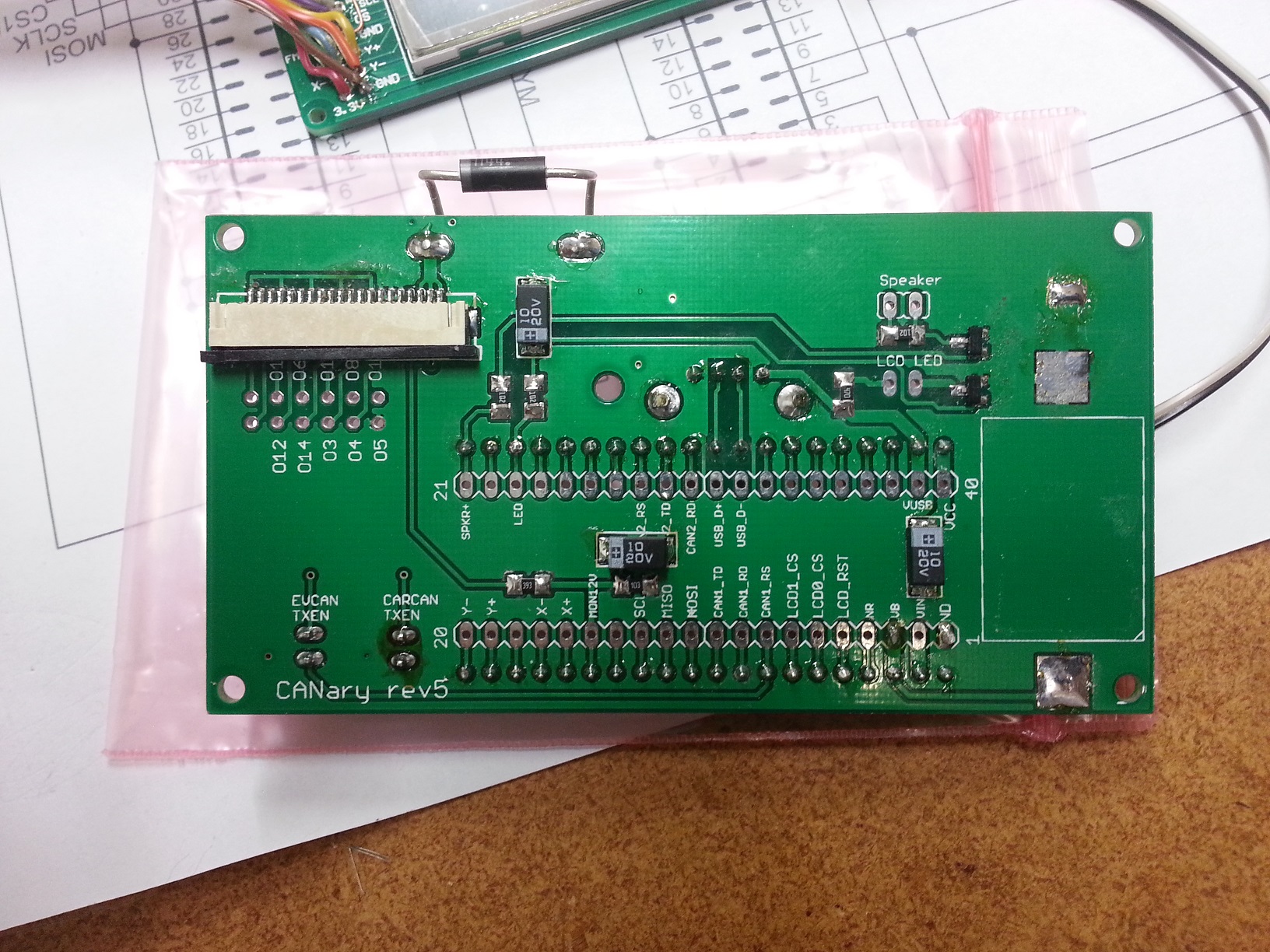
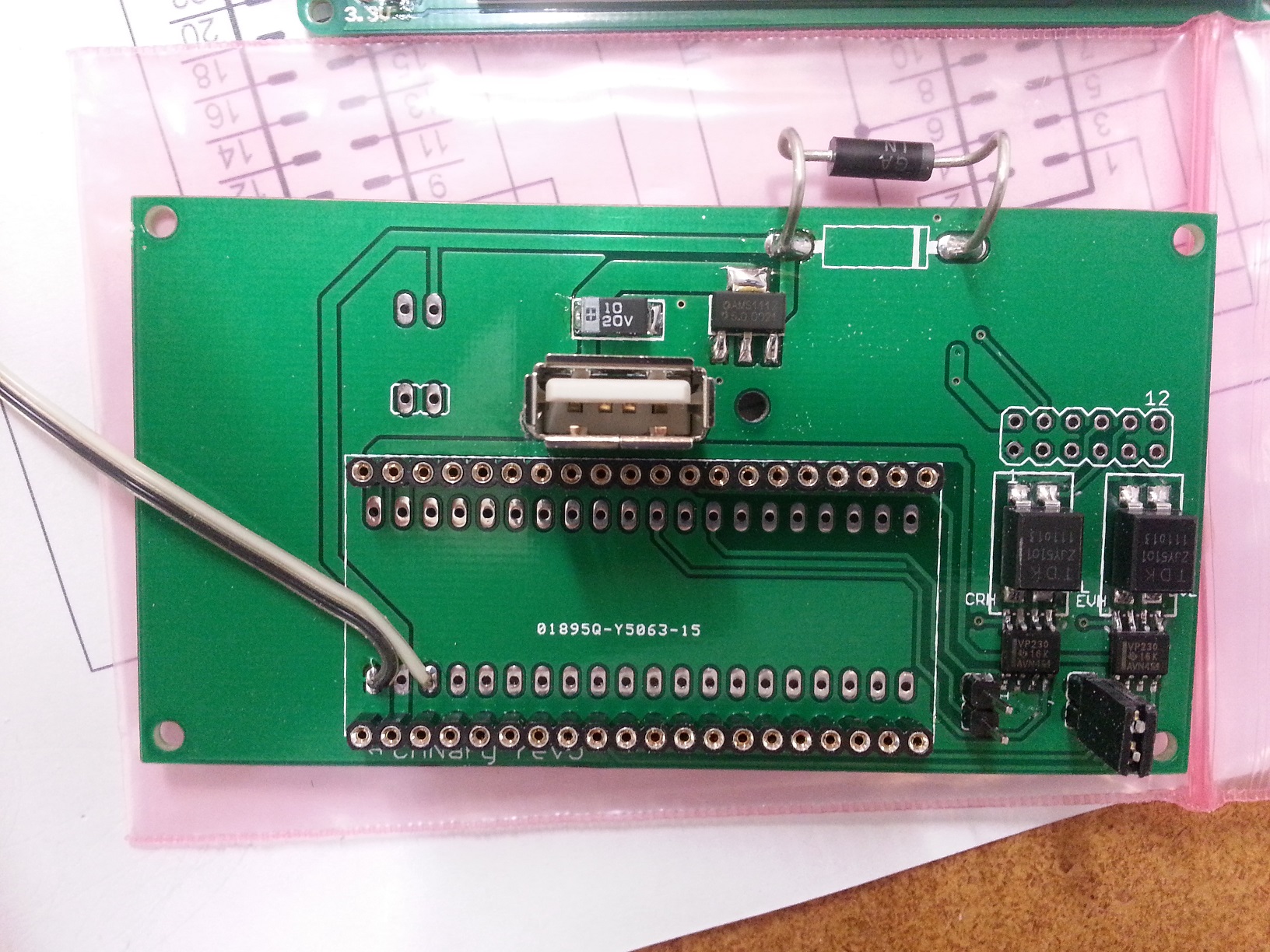
Once the PCB is populated, solder the LCDs to the PCB. CS0 connects to the right display and CS1 connects to the left.
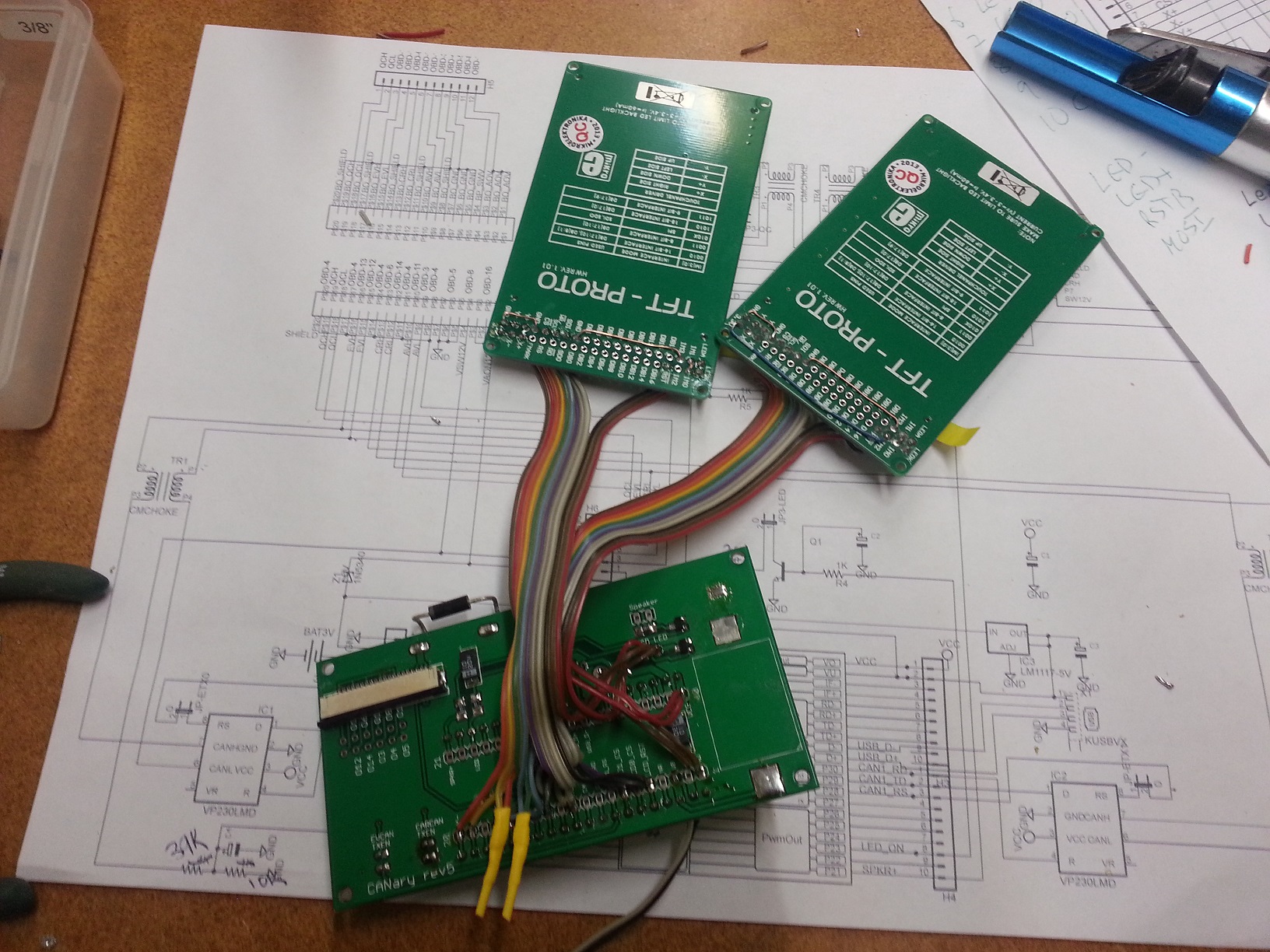
Update:
The Zener diodes tended to fail after a few months so I am recommending removing them and replacing with a DC-DC converter. This will run cooler and waste less energy, too. To install, remove the left display panel to gain access to the Zener. From there, the Zener can be removed and it's pads used to connect to the DC-DC converter. I recommend setting the output voltage on the bench before installing since the trim pot is tricky to reach once installed. Set it to 7V. The input can be connected to the left pad previously occupied by the zener and the output can connect to the right. GND(-) can be connected to the bottom right pad on the 2x6 header below the flex cable connector. Make sure the GND wire lies flat so it doesn't interfere with the connection of the flex cable.
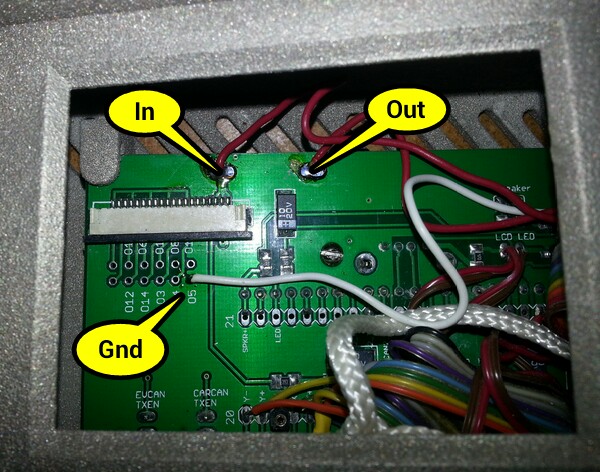
Once soldered in place, the DC-DC converter can easily be mounted to the back wall with double sided tape above the battery holder.
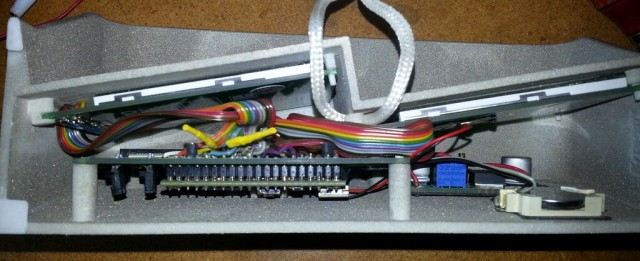
3) Testing
| 1) | First step is to buzz out all connections from the LCDs to the pins in the main board |
| 2) | Next check the touch screen connections. On the main board, place an Ohm meter across X+ and X-. You should read 700 Ohms. Repeat for Y+ and Y-. Then test the resistance from X+ to Y+. With nothing touching the screens, it should read >100K Ohms and <1K when touching either screen. |
| 3) | When all connections are checked, solder in the mbed. Download and install the touch2 program http://mbed.org/users/TickTock/code/touch2/ to test the basic operation of the mbed and touch screens. |
| tips: | |
| Touch screen is sensitive - excess flux on X+,X-,Y+,Y- connection on mbed can result in flakey operation | |
| If touch is not working, double-check the LCD0_CS and LCD1_CS are not swapped. LCD0_CS must connect to the CS of the LCD that has X- & Y- connected to the mbed. LCD1_CS must connect to the CS of the LCD that has X+ & Y+ connected to the mbed. | |
| 4) | Once touch2 works, it is time to connect to the OBD connector. I highly recommend double checking all connections from the OBD to the PCB with the cable in place before connecting to the Leaf. Buzz out all the pins in the OBS to make sure none are shorting to each other, Check that the 12V goes to the Zener (and nothing else) and the switched 12V to the resistor divider (and nothing else). Test the ground connection properly connects to ground and nothing else. |
| 5) | Once you are confident there are no shorts or wrong connections from the OBD connector, take a deep breath and plug it into your leaf. Touch2 program should come up and function. Unplug and install the latest CANary firmware. If you have the REV2.00 LCD boards, you will need to edit the precompile.h file in the TOUCH_TFTx2_w9341 library and set USE_ILI9341 to 1. Test all features before installing into the enclosure (gids, cellpair, menu system, logging) since installing and removing from the enclosure is a PITA. |
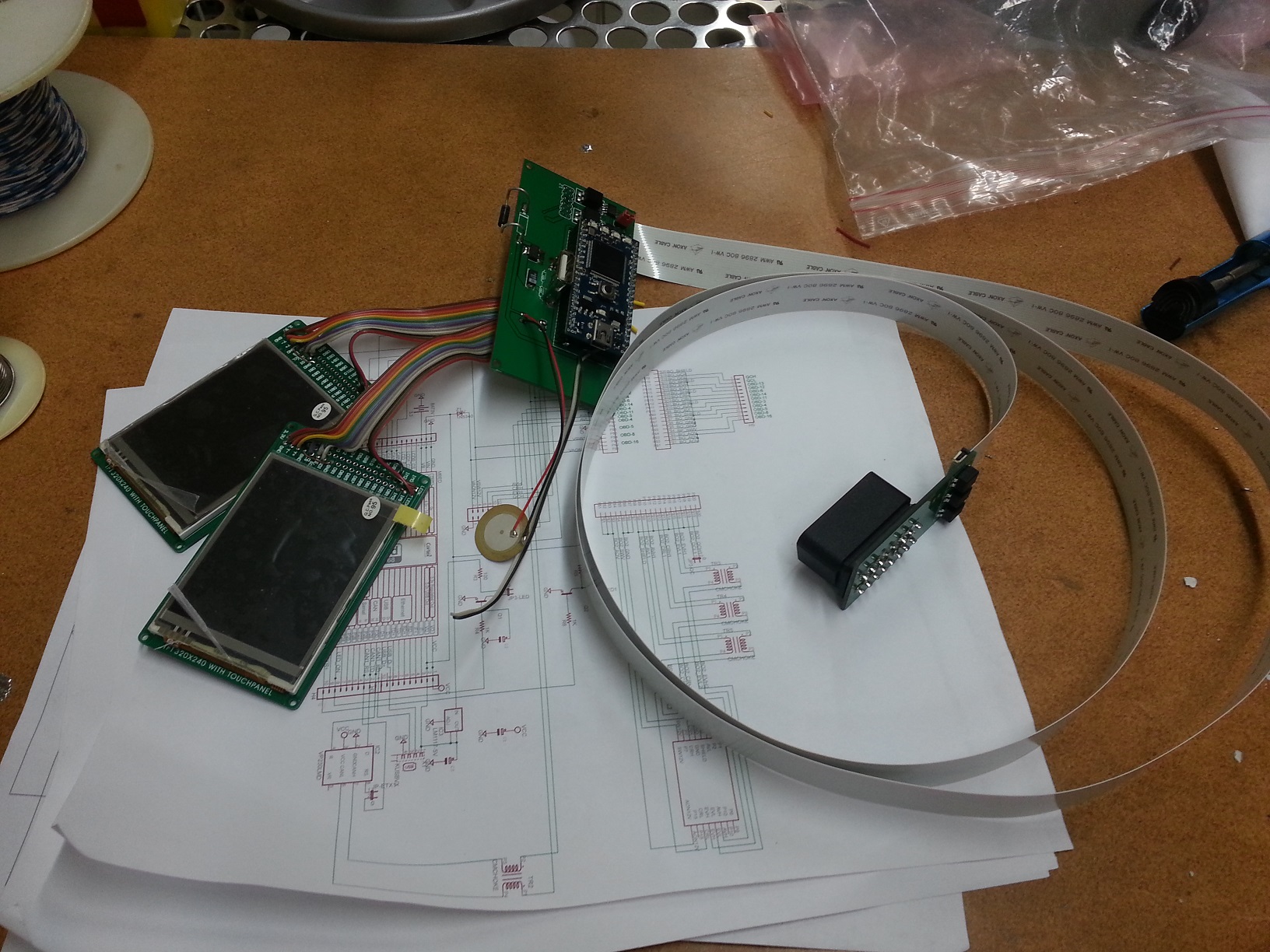
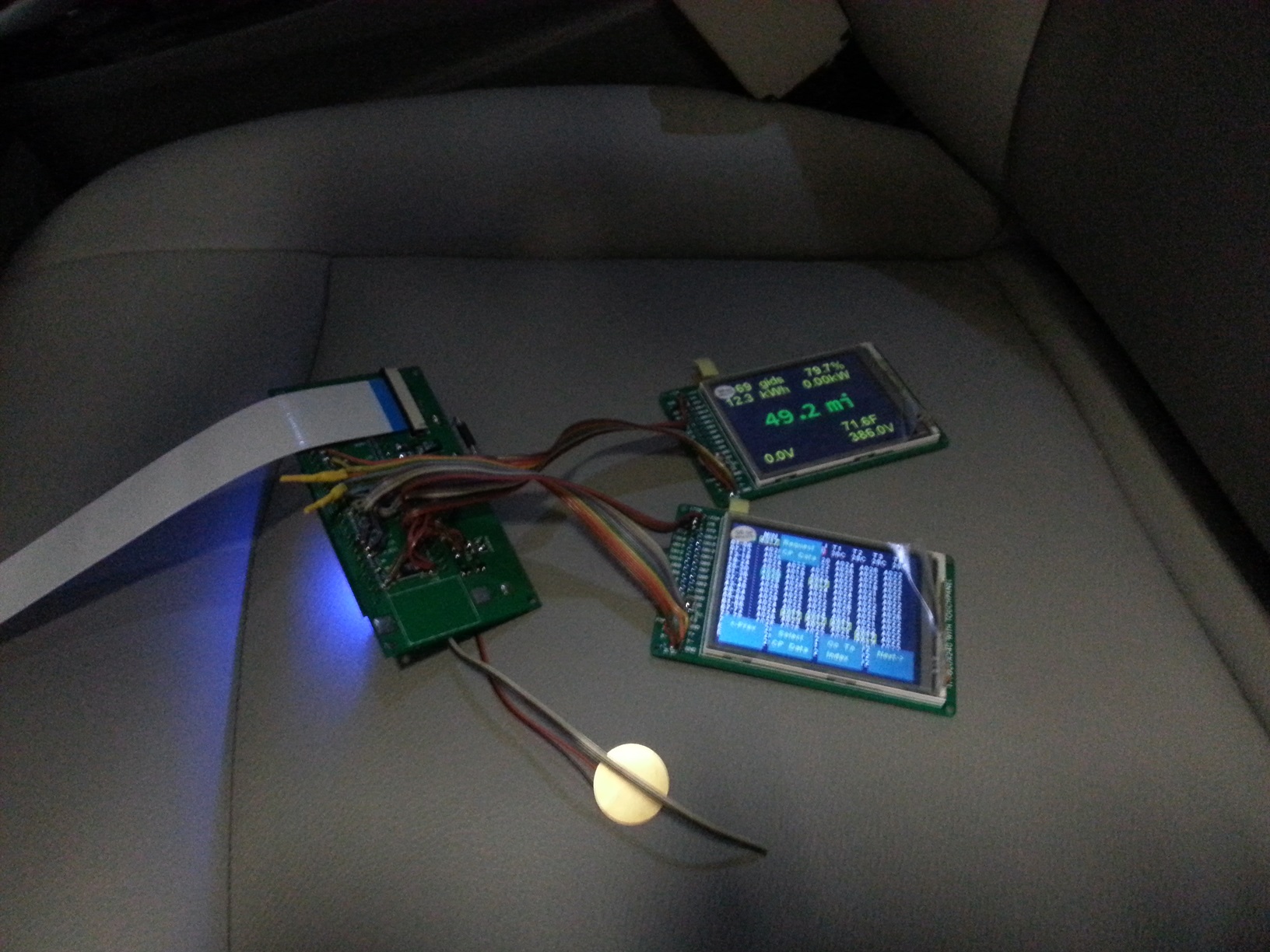
4) Enclosure
The 3D printer leaves a lot of powder behind - I used a strong spray of water to get it out of all the cracks. The enclosure comes with a rather rough finish. I recommend convincing yourself you like it, then simply lightly sand then paint before assembly. Sanding is very difficult - the nylon is very nicely fused and doesn't want to sand. I tried sandblasting and that didn't work either. I had some limited success with filler and then sanding, but only on the outside - it is too difficult to sand the face.
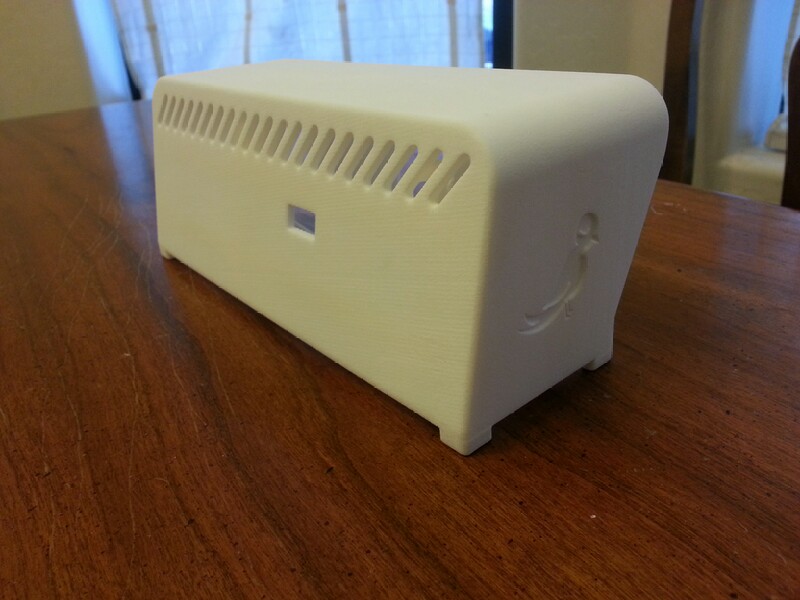
5) Final Assembly
Make sure you are well rested with lots of patience before attempting assembly. It is a puzzle figuring out how to get both displays and the PCB in place. Enclosure was too expensive for me to keep iterating to optimize for assembly. I ended up snipping the thin display posts shorter and using various tools to push the displays into place. Also, some USB connectors are taller than others. If you have one of the taller ones, you will have to deflect the back wall a bit while inserting the PCB (being careful not to bend the housing) to get it to it's opening in the back wall. Do use a screw in the provided post to secure the PCB as USB insertion will otherwise dislodge it.
I added an additional safety line which wraps around the center post to prevent the enclosure from becoming a projectile in the event of an accident.
 Installed:
Installed:
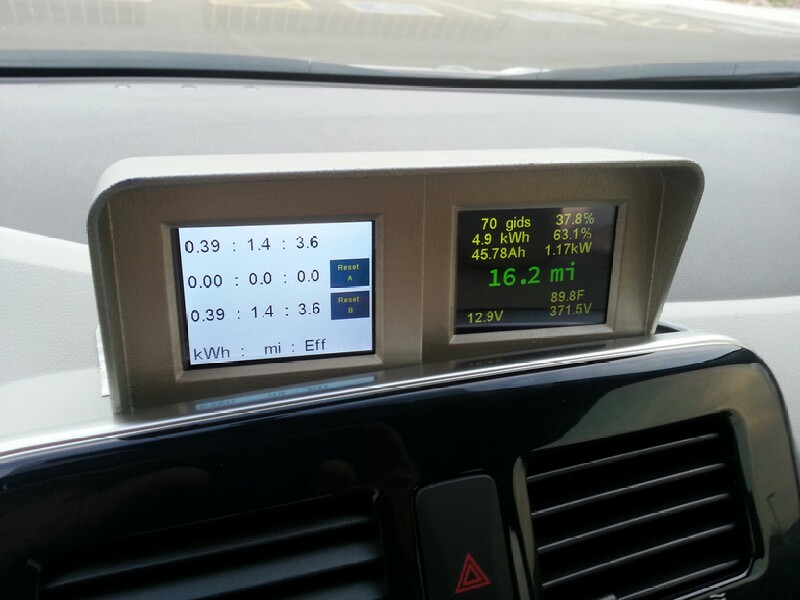
main.cpp
- Committer:
- TickTock
- Date:
- 2013-04-07
- Revision:
- 50:83d5864c64a0
- Parent:
- 49:a3d2c5bb3cfa
- Child:
- 51:6187c5264a73
File content as of revision 50:83d5864c64a0:
// main.cpp
//To Do:
// * USB device detect
// * Ability to update binary from the thumb-drive (requires file timestamp)
// * Audible friction brake feedback
// * User-configurable watchpoint
// * Better graphical DTE display with historic efficiency information considered and displayed
// * Add 50% charge option
// * Tire Pressure Sensor display
#include "mbed.h"
#include "CAN.h"
#include "beep.h"
#include "MSCFileSystem.h"
#include "PowerControl.h"
#include "EthernetPowerControl.h"
#include "utility.h"
#include "displayModes.h"
#include "TOUCH_TFTx2.h"
LocalFileSystem local("local");
// to write to USB Flash Drives, or equivalent (SD card in Reader/Writer)
MSCFileSystem fs("usb"); // to write to a USB Flash Drive
time_t seconds ;
Ticker autoPoll;
Ticker playback;
Timer timer;
DigitalOut led1(LED1);
DigitalOut led2(LED2);
DigitalOut led3(LED3);
DigitalOut led4(LED4);
InterruptIn touchpad(p17);
CAN can1(p9, p10); // CAN1 (EV) uses pins 9 and 10 (rx, tx) and pin 8 (rs)
DigitalOut can1SleepMode(p8); // Use pin 8 to control the sleep mode of can2
CAN can2(p30, p29); // CAN2 (CAR) uses pins 30 and 29 (rx, tx) and pin 28 (rs)
DigitalOut can2SleepMode(p28); // Use pin 28 to control the sleep mode of can1
AnalogIn mon12V(p15);
TOUCH_TFTx2 tt(p16, p17, p19, p20, p11, p12, p13, p6, p7, p5, "TFT"); // x+,x-,y+,y-,mosi, miso, sclk, cs0, cs1, reset
PwmOut dled(p23);
Beep spkr(p21);
bool logEn = false, logOpen = false;
bool yesBattLog = false ; // gg - Batt Log
FILE *cfile;
FILE *file;
char fileName[35] = "" ;
char writeBuffer[maxBufLen][13]; // buffer for USB write
char indexLastMsg[0x800]={0}; // index table for last message
CANMessage lastMsg[100]; // table to store last message of eachtype
unsigned char battData[256]={0};
unsigned char msgChanged[100]; // inidcates which bytes changed
char c;
volatile int writePointer = 0;
volatile int secsNoMsg = 0;
volatile int secsNoTouch = 0;
volatile bool canIdle;
volatile bool userIdle;
bool touched=false; //flag to read touchscreen
unsigned char whichTouched = 0;
char counter = 0;
unsigned char dMode[2] = {mainScreen,brakeScreen}; //display mode
unsigned char sMode = 0; // setup mode
unsigned char lastDMode[2] = {0,0}; //last screen mode
unsigned char dtMode = 6;
char displayLog[20][40];
unsigned char displayLoc = 0;
unsigned char indexOffset = 1;
bool showCP = false;
bool pollCP = false;
bool logCP = false; //Turbo3
bool repeatPoll = false;
bool headlights = false;
bool tick = false;
float ledHi = 0.8; // Bright LED value (until config file read)
float ledLo = 0.1; // Dim LED value (until config file read)
unsigned short pollInt = 300; // polling interval=5 minutes (until config file read)
bool accOn = false; // Accessories on
bool laccOn = false;
float scale12V = 16.2; // R1:R2 ratio
signed long mWs_x4 = 0;
unsigned short numWsamples = 0;
unsigned short numSsamples = 0;
float accV = 0;
bool playbackEn = false;
bool playbackOpen = false;
//float playbackInt = 0.05; //read messages every 50 ms
float playbackInt = 0.005; //read messages every 50 ms
bool step = false;
char header[5];
char data[8];
signed long motorRPM;
unsigned char skin = 0;
unsigned char dtePeriod = 14; //ten minute averaging interval
float mph[39]={0};
float kW[39]={0};
float mpkWh[39]={0};
// Logarithmic division scale (roughly - snapped to common units of time)
// First 10 are updated each second; the rest are updated each minute
float timeConstant[39] = {1, 1.58, 2.51, 3.98, 6.31, 10, 15.8, 25.1, 39.8, 60, // 1 minute
1.58, 2.51, 3.98, 6.31, 10, 15.8, 25.1, 39.8, 60, // 1 hour
60*1.58, 60*2.51, 60*3.98, 60*6.31, 60*10, 60*15.8, 60*24, // 1 day
60*24*1.58, 60*24*2.51, 60*24*3.98, 60*24*6.31, 60*24*10, 60*24*15.8, 60*24*30, // 1 month
60*24*39.8, 60*24*63.1, 60*24*100, 60*24*158, 60*24*251, 60*24*365}; // 1 year
bool updateDTE = false;
int main() {
int readPointer=0;
char sTemp[40];
unsigned long secs;
unsigned char i,j,display=0,lwt=0;
unsigned char minuteCount=0;
point lastTouch;
float average,mph9,kW9;
can1.monitor(true); // set to snoop mode
can2.monitor(true); // set to snoop mode
can1.frequency(500000);
can2.frequency(500000);
can1SleepMode = 1; // Turn on Monitor_only Mode
can2SleepMode = 1; // Turn on Monitor_only Mode
can1.attach(&recieve1);
can2.attach(&recieve2);
tt.set_orientation(1);
tt.background(Black);
tt.set_display(2); // select both displays
tt.cls();
tt.claim(stdout); // send stdout to the TFT display
touchpad.rise(&touch_ISR);
tt.wfi(); // enable interrupt on touch
dled = 0.8; // turn on display LED 80%
timer.start() ;
RTC_Init(); // start the RTC Interrupts that sync the timer
struct tm t; // pointer to a static tm structure
NVIC_SetPriority(TIMER3_IRQn, 1); //set ticker priority
NVIC_SetPriority(CAN_IRQn, 2); //higher than can (so RTC sync works)
seconds = time(NULL);
t = *localtime(&seconds) ;
// is it a date before 2012 ?
if ((t.tm_year + 1900) < 2012 ) {
// before 2013 so update year to make date entry easier
t.tm_year = 2013 - 1900;
// set the RTC
set_time(mktime(&t));
seconds = time(NULL);
}
t = *localtime(&seconds) ;
strftime(sTemp, 32, "%a %m/%d/%Y %X\n", &t);
logMsg(sTemp);
sprintf(sTemp,"CANary firmware rev50\n");
logMsg(sTemp);
// Look for new binary on thumbdrive
// Can't make this work right now since USB doesn't attach the right timestamp (so new binary isn't loaded)
/*cfile = fopen("/usb/CANary.bin", "rb");
lastDMode[whichTouched]=99;//force refresh
if (cfile!=NULL){ //found a new binary on the thumbdrive so copy it over
sprintf(sTemp,"New binary found.\n");
logMsg(sTemp);
file = fopen("/local/CANary.bin", "wb");
if (file==NULL){ //failed to open destination
sprintf(sTemp,"Unable to open destination file.\n");
logMsg(sTemp);
} else {
tt.set_display(2);
tt.foreground(White);
tt.background(Black);
tt.cls();
tt.locate(1,40);
printf("%s\n","Copying binary - Do no remove power.");
tt.locate(1,80);
printf("CANary will reset when complete.\n");
wait(1); //Wait 1 sec for display DMA to finish before writing file
while ( int size = fread( writeBuffer, sizeof(char), maxBufLen*13, cfile )){
fwrite( writeBuffer, sizeof(char), size, file );
led4=led3;
led3=led2;
led2=led1;
led1=!led4;
}
fclose(cfile);
fclose(file);
remove("/usb/CANary.bin"); // delete original
mbed_reset(); //restart
}
}*/
secsNoMsg = 0;
//read efficiency history data
cfile = fopen("/local/ehist.cny", "r");
if (cfile!=NULL){ // found a efficiency history file
for(i=0;i<39;i++){
if(!feof(cfile)){
fscanf(cfile,"%f %f\r\n",&mph[i],&kW[i]);
mpkWh[i]=mph[i]/kW[i];
}
}
fclose(cfile);
sprintf(sTemp,"History Loaded.\n");
logMsg(sTemp);
} else { // create initial file
sprintf(sTemp,"History not found. Created.\n");
logMsg(sTemp);
for(i=0;i<39;i++){
// Pre-load with 4 mpkWh @ 40 mph
mph[i]=40*timeConstant[i];
kW[i]=10*timeConstant[i];
mpkWh[i]=4;
}
}
// Read config file
readConfig();
touched=false;
secsNoTouch=2;
while (true) {
if (!logOpen) { // Open new file if one is not already open
if(logEn){ //logging enable
seconds = time(NULL);
t = *localtime(&seconds) ;
strftime(fileName, 32, "/usb/%m%d%H%M.alc", &t); //mmddhhmm.alc
//sprintf(sTemp,"Using file %s\n",fileName);
//logMsg(sTemp);
file = fopen(fileName, "ab");
lastDMode[whichTouched]=99;//force refresh
if(file==NULL){
sprintf(sTemp,"\nUnable to open %s\n\n\n\n",fileName);
logMsg(sTemp);
logEn=false;
spkr.beep(1000,0.25);
} else {
logOpen = true;
readPointer=writePointer;
sprintf(sTemp,"Starting Can Log %s\n",fileName);
logMsg(sTemp);
logTS();
spkr.beep(2000,0.25);
}
}//logging enabled
} else { // if (logOpen)
if (((writePointer+maxBufLen-readPointer)%maxBufLen)>(maxBufLen/16)||canIdle||!logEn) {
// Dump buffer if > 1/16 full or canbus has stopped
if (file == NULL) {
logOpen = false;
sprintf(sTemp,"Failed to append log file.\n");
logMsg(sTemp);
spkr.beep(1000,0.25);
logEn=false;
} else {
if (((writePointer+maxBufLen-readPointer)%maxBufLen)>(maxBufLen*7/8)) { // Hi-water mark
sprintf(sTemp,"Write buffer overrun.\n");
logMsg(sTemp);
spkr.beep(1000,0.25);
}
while (readPointer != writePointer) {
for (j = 0; j<13; j++){
fprintf(file,"%c",writeBuffer[readPointer][j]);
}
if(++readPointer >= maxBufLen)
readPointer=0;
}
led4 = !led4;
}
} // if > 1/16 full, canbus has stopped, or logging stopped
if (!logEn) {
fclose(file);
logOpen=false;
}
} // if logOpen
if (canIdle&&userIdle&&!playbackEn) { // canbus idle --> sleep to save power
if (logOpen){
fclose(file);
} // if (logOpen)*/
seconds = time(NULL);
t = *localtime(&seconds) ;
strftime(sTemp, 40, "Sleeping: %a %m/%d/%Y %X\n", &t);
logMsg(sTemp);
updateDisplay(0); //Added for turbo3 who has a display override and wants to see the sleep message before going to sleep
updateDisplay(1);
//LPC_RTC->CIIR=0x00; // block RTC interrupts
led1=0;
led2=0;
led3=0;
led4=0;
dled=0; // turn off display
secs = time(NULL); // seconds past 12:00:00 AM 1 Jan 1900
while (secsNoMsg>canTimeout && !touched) {
//DeepPowerDown();
tt.wfi(); //enable touch interrupt
//__wfi(); // freeze CPU and wait for interrupt (from canbus or touch)
Sleep();
}
secsNoTouch=2;
canIdle=secsNoMsg>canTimeout;
//userIdle=!touched;
dled=0.8; // turn on display LED
seconds = time(NULL);
t = *localtime(&seconds) ;
strftime(sTemp, 40, "Waking: %a %m/%d/%Y %X\n", &t);
logMsg(sTemp);
if (time(NULL)>(secs+1800)) {
logOpen = false; // Start new file if asleep for more than 30 minutes
if (secsNoTouch>100) secsNoTouch = 100; // also mostly reset user Idle counter
} else if (logOpen){ // insert timestamp on each wake if logging enabled (disabled for now)
file = fopen(fileName, "ab");
logTS();
}
} // if idle
if(touched){ // call touchscreen procedure if touch interrupt detected
lastTouch = tt.get_touch();
lastTouch = tt.to_pixel(lastTouch); // convert to pixel pos
if((lastTouch.x!=639)&&(lastTouch.x!=319)&&(lastTouch.y!=239)){ // filter phantom touches
if (userIdle) {
secsNoTouch=2; // Ignore first touch if user idle
userIdle=false;
} else {
secsNoTouch=0;
}
if (lastTouch.x>320){
whichTouched=1;
} else {
whichTouched=0;
}
if (whichTouched!=lwt){
lastDMode[lwt]=99; // Repaint lastTouched
lwt=whichTouched;
}
sMode = 1;
}
//sprintf(sTemp,"%d,%d ",lastTouch.x,lastTouch.y);
//logMsg(sTemp);
touched = false; // clear interrupt flag
}
if (!userIdle) {
if (secsNoTouch<2) {// Recently touched
secsNoTouch +=2; // increment to prevent double touch
sMode = 1;
//sprintf(sTemp,"button %d %d,%d %d\n",i,buttonX(lastTouch.x,3),buttonY(lastTouch.y,3),lastTouch.x);
//logMsg(sTemp);
switch (sMode) {
case 0: // no select
break;
case 1: // select screen
switch (buttonX(lastTouch.x,3)*10+buttonY(lastTouch.y,3)) {
case 00:
case 30:
if (dMode[whichTouched]==monitorScreen||dMode[whichTouched]==changedScreen) {
indexOffset=indexOffset>4?indexOffset-4:1;
} else if (dMode[whichTouched]==config1Screen) {
wait_ms(500);
tt.background(Black);
tt.calibrate();
} else if (dMode[whichTouched]==playbackScreen) { // slower
playbackInt *=2;
if(playbackEn){
playback.detach();
playback.attach(&playbackISR,playbackInt);
}
}
break;
case 10:
case 40:
if (dMode[whichTouched]==changedScreen) {
for(j=0;j<100;j++) msgChanged[j]=0; // clear changed data
lastDMode[whichTouched]=99;//force refresh
} else if (dMode[whichTouched]==cpScreen) {
pollCP=true;
} else if (dMode[whichTouched]==cpHistScreen) { // gg - hist
pollCP=true;
} else if (dMode[whichTouched]==cpBarScreen) { // gg - cpbars
pollCP=true;
} else if (dMode[whichTouched]==config1Screen) {
mbed_reset();
} else if (dMode[whichTouched]==playbackScreen) { // pause/unpause
playbackEn=!playbackEn;
if(playbackEn){
playback.attach(&playbackISR,playbackInt);
}else{
playback.detach();
}
}
break;
case 20:
case 50:
if (dMode[whichTouched]==monitorScreen||dMode[whichTouched]==changedScreen) {
indexOffset=indexOffset<77?indexOffset+4:80;
} else if (dMode[whichTouched]==config1Screen) {
sprintf(sTemp,"Saving config file.\n");
logMsg(sTemp);
saveConfig();
spkr.beep(2000,0.25);
} else if (dMode[whichTouched]==playbackScreen) { // faster
if(playbackInt>.002){
playbackInt/=2;
if(playbackEn){
playback.detach();
playback.attach(&playbackISR,playbackInt);
}
}
}
break;
case 01:
case 31: // row 2 left
if (dMode[whichTouched]==config1Screen) {
logEn = !logEn;
if (!logEn) repeatPoll=false; // disable auto polling, too
} else if (dMode[whichTouched]==dateScreen){
dtMode=(dtMode<6)?dtMode+1:0;
lastDMode[whichTouched]=99;
}
break;
case 11:
case 41: // row 2 center
if (dMode[whichTouched]==config1Screen){
repeatPoll = !repeatPoll&&logEn;
if (repeatPoll) {
autoPoll.attach(&autoPollISR,pollInt);
} else {
autoPoll.detach();
}
} else if (dMode[whichTouched]==playbackScreen) {
// Start/stop playback
if(!playbackOpen){
if(!logOpen){
file = fopen("/usb/playback.alc", "rb");
lastDMode[whichTouched]=99;//force refresh
if(file==NULL){
sprintf(sTemp,"Unable to open /usb/playback.alc\n");
logMsg(sTemp);
spkr.beep(1000,0.25);
} else {
playbackOpen = true;
playbackEn=true;
playback.attach(&playbackISR,playbackInt);
sprintf(sTemp,"Starting playback\n");
logMsg(sTemp);
spkr.beep(2000,0.25);
can1.attach(&doNothing);// Stop recieving CAN data
can2.attach(&doNothing);
}
} else {
sprintf(sTemp,"Must stop logging first\n");
logMsg(sTemp);
}
} else {
playback.detach();
fclose(file);
playbackOpen=false;
playbackEn=false;
can1.attach(&recieve1);// Restore CAN data recieve
can2.attach(&recieve2);
lastDMode[whichTouched]=99;
}
} else if (dMode[whichTouched]==dateScreen){
upDate(dtMode,true);
lastDMode[whichTouched]=99;
}
break;
case 21:
case 51: // row 2 right button
if (dMode[whichTouched]==config1Screen) { // gg - Batt Log Enable Button
yesBattLog = !yesBattLog;
} else if (dMode[whichTouched]==dateScreen){
upDate(dtMode,false);
lastDMode[whichTouched]=99;
}
break;
case 02:
case 32:
dMode[whichTouched]=dMode[whichTouched]>0?dMode[whichTouched]-1:maxScreens;
break;
case 12:
case 42:
//secsNoTouch = userTimeout; // immediately exit config mode
sMode=0;
lastDMode[whichTouched]=99; // Repaint
break;
case 22:
case 52:
dMode[whichTouched]=dMode[whichTouched]<maxScreens?dMode[whichTouched]+1:0;
break;
default:
break;
}
break;
case 2: // numpad
break;
case 3:
break;
default:
break;
} // case sMode
} //recently touched
} else { // userIdle
if(sMode==1){
sMode=0;
lastDMode[whichTouched]=99;
}
}
if(tick){ // Executes once a second
accV=floor(mon12V*scale12V*10+0.5)/10; //Round to nearest 10th
accOn=(accV>5)?true:false;
if(laccOn&&!accOn){ // Car turned off
//write efficiency history data
cfile = fopen("/local/ehist.cny", "w");
if (cfile!=NULL){ // found a efficiency history file
for(i=0;i<39;i++){
fprintf(cfile,"%f %f\r\n",mph[i],kW[i]);
}
fclose(cfile);
}
}
laccOn=accOn;
if(!accOn&&!logEn&&userIdle&&!playbackEn){
//sprintf(sTemp,"Display Off %4.2f\n",accV);
//logMsg(sTemp);
dled = 0; // turn off display if car off and logging disabled and no user activity
}else if(!headlights){
dled = ledHi;
}else{
dled = ledLo;
}
//compute historic efficiency
if(numSsamples>0){ // Avoid div0
mph[0]=((float) motorRPM)/numSsamples/215; // Empirically derived - may change car to car
}else{
mph[0]=0;
}
if(mph[0]>99){
mph[0]=0;
}
mpkWh[0]=mph[0];
if(numWsamples>0){ // Avoid div0
kW[0]=((float) mWs_x4)/numWsamples/4e3;
mpkWh[0]/=kW[0];
if (mpkWh[0]<0) {
mpkWh[0]=99;// negative means inf.
}
}else{
kW[0]=0;
mpkWh[0]=0;
}
//mpkWh[0]=floor(mpkWh[0]*10+0.5)/10; // Round to nearest 10th
motorRPM=0;
numSsamples=0;
mWs_x4=0;
numWsamples=0;
// First ten are updated each second
for(i=1;i<10;i++){
mph9=mph[i]/timeConstant[i];
mph[i]-=mph9;
mph[i]+=mph[0];
kW9=kW[i]/timeConstant[i];
kW[i]-=kW9;
kW[i]+=kW[0];
mpkWh[i]=mph[i];
mpkWh[i]/=kW[i];
if (mpkWh[i]<0) {
mpkWh[i]=99;// negative means inf.
}
//mpkWh[i]=floor(mpkWh[i]*10+0.5)/10; // Round to nearest 10th
}
// The rest are updated each minute
if(++minuteCount>59){ //
minuteCount=0;
for(i=10;i<39;i++){
average=mph[i]/timeConstant[i];
mph[i]-=average;
mph[i]+=mph9;
average=kW[i]/timeConstant[i];
kW[i]-=average;
kW[i]+=kW9;
mpkWh[i]=mph[i];
mpkWh[i]/=kW[i];
if (mpkWh[i]<0) {
mpkWh[i]=99;// negative means inf.
}
//mpkWh[i]=floor(mpkWh[i]*10+0.5)/10; // Round to nearest 10th
}
}
updateDTE=true;
if(logCP)
logPackVoltages(); // Turbo3
tick=false;
}
display=display<1?display+1:0; // toggle display
updateDisplay(display);
if(pollCP){ // We do this inside main loop instead of ticker so CAN RX will not be blocked
sendCPreq(); // send cellpair data request.
wait_ms(16);
sendTreq(); //send temperature request
pollCP=false;
}
if(step){ // playback
if(playbackOpen&&playbackEn){
for(i=0;i<120;i++){
if(!feof(file)){
fscanf(file,"%5c%8c",&header,&data);
logCan(header[0],CANMessage(0x7ff&((header[4]<<8)+header[3]), data, 8));
}else{
fclose(file); // restart
file = fopen("/usb/playback.alc", "rb");
lastDMode[whichTouched]=99;//force refresh
spkr.beep(2000,0.25);
}
}
}
step=false;
}
} //while (true)
}
